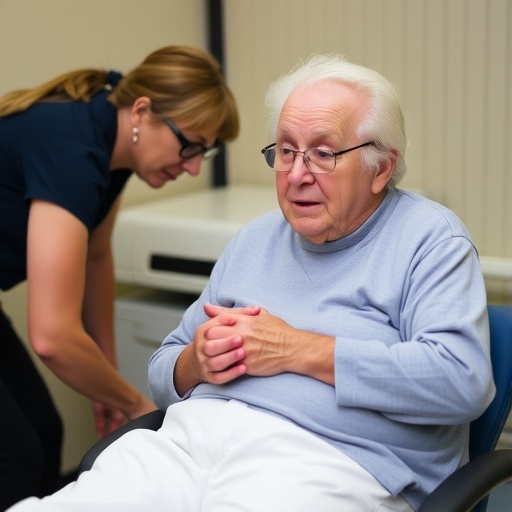In the realm of geriatric care, a pivotal study has emerged that delves into the complexities of frailty among older adults. The research titled “Frailty in older people: rehabilitation treatment research examining separate settings PLUS (FORTRESS PLUS)” opens a new avenue for understanding how specialized rehabilitation interventions can be tailored to address the unique challenges faced by elderly populations. This groundbreaking study, spearheaded by Tran, Lockwood, and Murray, sets the stage for a deeper exploration of frailty and its implications on health outcomes and quality of life in older individuals.
Frailty is a clinical syndrome characterized by a decrease in physiological reserve and increased vulnerability to stressors, which can result in adverse health outcomes. It’s a condition that affects a significant portion of the aging population, leaving them susceptible to a myriad of health complications, including falls, hospitalizations, and even mortality. The robust framework of the FORTRESS PLUS trial aims to systematically investigate how specific rehabilitation strategies can mitigate these risks and enhance overall wellness among older adults.
The researchers have designed a single-arm intervention trial that introduces a comprehensive rehabilitation program specifically curated for frail older adults. Unlike traditional trials, this study utilizes historical controls as a reference to ascertain the effectiveness of the intervention. This innovative approach not only helps in establishing a baseline but also strengthens the validity of the findings, providing a clearer picture of the potential benefits of targeted rehabilitation strategies.
Participants in the FORTRESS PLUS trial will engage in a structured rehabilitation regimen that encompasses various dimensions such as physical, psychological, and social well-being. With a focus on holistic care, this intervention seeks to integrate physical therapy, occupational therapy, and mental health support to ensure a well-rounded approach to healing and recovery. The expectation is that by addressing the multifaceted nature of frailty, researchers can achieve significant improvements in participants’ functional independence and quality of life.
The protocol also emphasizes data collection and analysis that align with the highest standards of clinical research. By meticulously documenting the participants’ progress, the study aims to uncover intricate details about the efficacy of specific rehabilitation practices. Such data will prove invaluable not only for academic purposes but also for informing policy decisions and clinical protocols in geriatric care settings.
Moreover, the FORTRESS PLUS trial recognizes the critical importance of environmental factors in the rehabilitation journey of older adults. The study incorporates considerations of different settings—be it home-based, community-centric, or institutional rehabilitation. By examining the outcomes across these diverse environments, the researchers hope to identify the most effective strategies for implementing rehabilitation programs in various contexts, ultimately improving accessibility and adherence among older populations.
One notable aspect of this research is the emphasis on participant engagement. The design of interventions is not solely focused on the physiological aspects of rehabilitation but also on cultivating a supportive community. Researchers are examining how social interactions and community involvement can enhance recovery outcomes, fostering a sense of belonging and purpose among older adults. This sociocultural component is essential, as feelings of isolation and loneliness are rampant in the frail elderly population.
As the researchers embark on this significant journey, they are mindful of the ethical considerations inherent in conducting clinical trials with vulnerable groups. Safety and well-being will be prioritized throughout the study, ensuring that participants are protected and that their rights are respected. Informed consent processes will be rigorously followed, and the research team is committed to creating an environment where participants feel comfortable and empowered to engage in their rehabilitation journey.
The anticipated outcomes of the FORTRESS PLUS trial could set a precedent for future intervention studies. By generating robust data on the effectiveness of tailored rehabilitation protocols, this research has the potential to influence clinical practices and policies on a larger scale, ultimately improving the care provided to older adults across various healthcare settings.
Furthermore, the insights gained from this study could pave the way for innovative rehabilitation models that transcend traditional boundaries. As the healthcare landscape evolves, there is a growing need for adaptive approaches that cater to the individualized needs of aging populations. This research may serve as a catalyst for broader discussions on how to modernize geriatric care through evidence-based practices.
As the trial progresses and results become available, the academic and medical communities will be watching closely. The FORTRESS PLUS intervention’s findings may illuminate new pathways for managing frailty, providing hope to healthcare providers and families caring for older adults. The proactive approach outlined in this study represents a promising step forward in addressing one of the most pressing challenges in geriatric medicine.
In conclusion, the ongoing FORTRESS PLUS study encapsulates the essence of what is needed in the field of geriatric rehabilitation: a focus on holistic care that bridges physical, psychological, and social aspects. As we intricately examine the nuances of frailty among older adults, this research stands to reshape our understanding and approach to geriatric care for years to come. The implications of this study could resonate beyond academia, touching the lives of countless individuals and fostering a culture of care that honors the dignity and potential of older adults.
Subject of Research: Frailty in older people
Article Title: Frailty in older people: rehabilitation treatment research examining separate settings PLUS (FORTRESS PLUS): protocol for a single arm intervention trial with comparison to historical controls.
Article References: Tran, R., Lockwood, K., Murray, J. et al. Frailty in older people: rehabilitation treatment research examining separate settings PLUS (FORTRESS PLUS): protocol for a single arm intervention trial with comparison to historical controls. BMC Geriatr 25, 850 (2025). https://doi.org/10.1186/s12877-025-06425-3
Image Credits: AI Generated
DOI: https://doi.org/10.1186/s12877-025-06425-3
Keywords: Frailty, Rehabilitation, Geriatrics, Elderly Care, Intervention Study
Tags: addressing challenges in elderly healthclinical syndrome of frailtycomprehensive rehab programs for elderlyevidence-based geriatric careFORTRESS PLUS studyfrailty in older adultsgeriatric rehabilitation strategieshealth outcomes in aging populationimproving quality of life for seniorsinterventions for elderly frailtymitigating health risks in older adultsrehabilitation for vulnerable seniors





